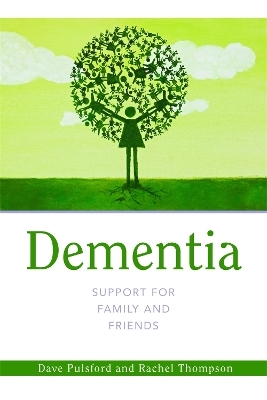
Dementia - Support for Family and Friends
Jessica Kingsley Publishers (Verlag)
978-1-84905-243-6 (ISBN)
For friends, family members and carers of people with dementia, understanding the condition and coping with the impact it has on their lives can be extremely challenging. This book, written specifically for these groups, explores each stage of the journey with dementia and explains not only how it will affect the person with the condition, but also those around them, and how best to offer support and where to get professional and informal assistance. It focuses on the progressive nature of dementia and the issues that can arise as a result, and gives practical advice that can help to ensure the best possible quality of life both for the person with dementia and the people around them.
A comprehensive and practical introduction to the condition, this book is essential reading for anyone who has a friend or relative with dementia.
Dave Pulsford is Senior Lecturer in Mental Health Nursing at the University of Central Lancashire, UK. Rachel Thompson is Dementia Project Lead for the Royal College of Nursing (RCN) and is an Admiral Nurse with Dementia UK. Both have significant experience of nursing in dementia care in practice, research, teaching, and professional writing in this field.
Introduction: About This Book. 1. Becoming Acquainted with Dementia. What is dementia? The extent of dementia worldwide. Dementia in "minority groups". Can dementia be treated, cured or prevented? The goals of supporting a person with dementia: Quality of life and well-being. Being a family member or friend of a person with dementia. The basis of supporting a person with dementia: Cognitive empathy. Supporting the person - assistance versus independence. What family members and friends need to support a person with dementia. 2. Someone Close to Me May Have Dementia - Assessment, Diagnosis and Types of Dementia. Identifying dementia. The first signs of dementia. How people with dementia react to the onset of the condition. Diagnosing dementia. Why is diagnosis important and why do many people with dementia not receive a diagnosis? Should the person with dementia be told the diagnosis? After the diagnosis. The main types of dementia. Types of young-onset dementia. 3. Beginning the Journey - the Early Phase of Dementia. The characteristics of early dementia. Cognitive empathy and early dementia. Awareness and mental capacity in early dementia. Planning for the future. Maintaining relationships and keeping active in the phase of early dementia. Compiling a life story. Intimacy and sexuality. Maintaining and giving up independence in the early phase of dementia. Health and social care support for people with early dementia, their families and friends. Family members and friends - looking after oneself and each other. 4. More Help Needed - the Phase of Moderate Dementia. The characteristics of moderate dementia. Where do people with moderate dementia live? The changing nature of relationships. Communication and language in moderate dementia. Social and leisure activities for people with moderate dementia. 5. The Challenges of Moderate Dementia. Behaviour that others find difficult. When the person lacks awareness that their actions will put them at risk of coming to harm. When the person's manner and actions indicate that they are in distress. When the person behaves in ways that are socially inappropriate. When the person tries to get their needs met through behaving aggressively or with hostility. When the person seems to be unwilling to accept help from others. The role of medication. Challenges to eating and drinking. Meeting continence needs. Sleep disturbances. Professional support for people with moderate dementia, their families and friends. When people with dementia are admitted to hospital. Vulnerability and abuse. 6. The Decision - Considering Residential Care for People with Dementia. Perceptions of residential care. What is residential care? The decision. Choosing a care home. What should be expected of a care home? Visiting a care home. Making the transition. Staying involved. Issues with residential care. Concerns about standards of care. Conclusion: Care homes are places to live! 7. Completing the Journey - The Phase of Advanced Dementia. The characteristics of advanced dementia. Well-being and ill-being in advanced dementia. Relationships with a person with advanced dementia. Communication in advanced dementia. Activity and advanced dementia. Helping people with advanced dementia in activities of daily living. Approaching the end of life. 8. The End of Life. What is meant by "end of life"? What causes death among people with dementia? The feelings of family members and friends as end of life approaches. How would we want to die? Dementia and end of life care. A good death? Support after death. Conclusion: Suffering from dementia or living with dementia? Appendix: Resources for Families and Friends Worldwide. References. Index.
| Erscheint lt. Verlag | 15.10.2012 |
|---|---|
| Reihe/Serie | Support for Family and Friends |
| Verlagsort | London |
| Sprache | englisch |
| Maße | 166 x 231 mm |
| Gewicht | 364 g |
| Themenwelt | Sachbuch/Ratgeber ► Gesundheit / Leben / Psychologie ► Krankheiten / Heilverfahren |
| Medizin / Pharmazie ► Gesundheitswesen | |
| Medizin / Pharmazie ► Medizinische Fachgebiete ► Geriatrie | |
| Sozialwissenschaften ► Pädagogik ► Sozialpädagogik | |
| Sozialwissenschaften ► Soziologie | |
| ISBN-10 | 1-84905-243-3 / 1849052433 |
| ISBN-13 | 978-1-84905-243-6 / 9781849052436 |
| Zustand | Neuware |
| Haben Sie eine Frage zum Produkt? |
aus dem Bereich


